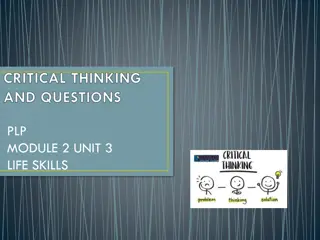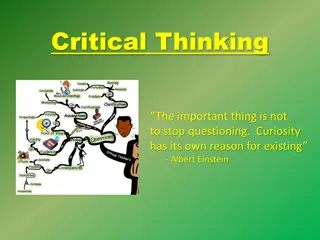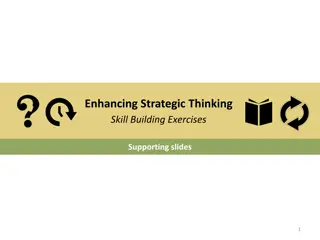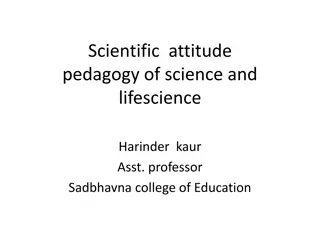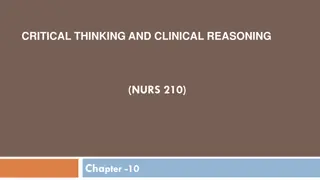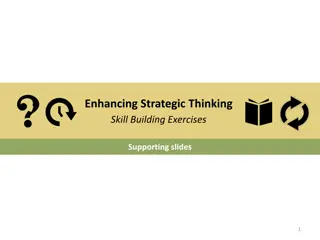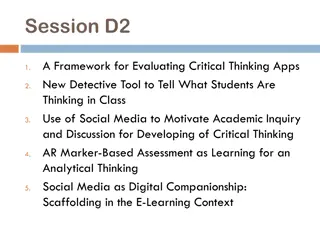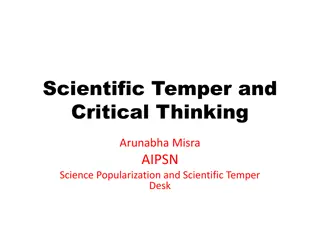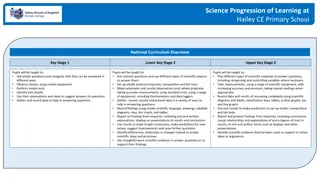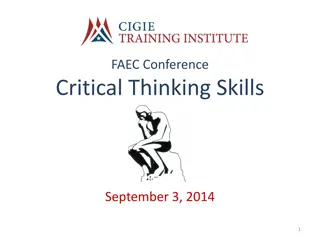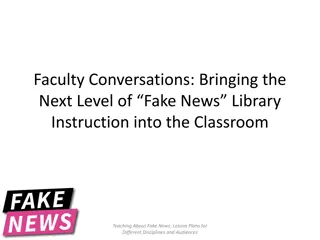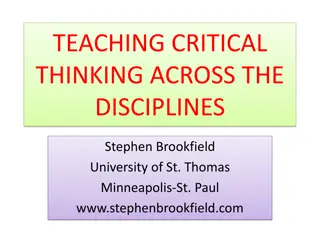Enhancing Critical Thinking Skills in Scientific Research
Critical thinking plays a pivotal role in scientific endeavors, enabling researchers to observe, hypothesize, experiment, and draw valid conclusions. Being a natural skeptic is crucial for scientists to scrutinize research papers effectively. By carefully analyzing prior findings, research techniques, data, and statistical methods, scientists can ensure the reliability of their work. Embracing skepticism and applying critical analysis are key to refining scientific knowledge and enhancing research credibility.
Download Presentation

Please find below an Image/Link to download the presentation.
The content on the website is provided AS IS for your information and personal use only. It may not be sold, licensed, or shared on other websites without obtaining consent from the author.If you encounter any issues during the download, it is possible that the publisher has removed the file from their server.
You are allowed to download the files provided on this website for personal or commercial use, subject to the condition that they are used lawfully. All files are the property of their respective owners.
The content on the website is provided AS IS for your information and personal use only. It may not be sold, licensed, or shared on other websites without obtaining consent from the author.
E N D
Presentation Transcript
Critical Thinking- Analysis of an Argument G.P. Taylor, Ph.D. University of Texas at San Antonio
Critical Thinking Deciding rationally what to or what not to believe Norris, Stephen P. "Synthesis of Research on Critical Thinking. Educational Leadership, v 42 n 8 May 1985. 40-45.
Critical Thinking Careful and deliberate determination of whether to accept, reject, or suspend judgment. Moore and Parker, 1994.
In Science, Critical Thinking is used when you Observe problem/phenomenon/conceive ideas Develop a hypothesis Make predictions: Formulate experiments Test Predictions: Carry out experiments/analyze data Draw conclusions from results, modify hypothesis Modify as needed and do again. Reject or confirm hypothesis The Scientific Method itself involves critical thinking VITAL for a scientist. Impressive for a science student Need to have time to read and think
Scientists are Natural Skeptics Big thing to learn during Grad school: Be critical of everything! What can you doubt about a scientific paper?
Possible Doubts for Paper Are their ideas supported by prior findings? Are their techniques correct? Why did they choose the techniques they chose? Can their machines measure what they say? Did they do the correct controls (could the effect arise from some other factor??) Does their data look random enough? Did they analyze their data correctly? Did they use correct statistical techniques? Did they interpret their data correctly? Are their conclusions supported by the data?
Here, well practice being critical Analyze during class. 1 exercise from the GRE questions pool Identify major problems with given arguments
How to Approach? Given: There are flaws? What are they? Where are the problems? Analyze line of reasoning Consider questionable assumptions Does evidence support the conclusion? What additional evidence is needed to strengthen or weaken argument? What other info is needed to evaluate the conclusion?
Weak Analogy Conclusion about one thing, based on success or failure of another with many other variables present Ex: A biotechnology company is doing well in SA I ll open one as well
Confusing Cause and Effect Ice cream consumption leads to criminal behavior Other factors: Summer heat, out of school, etc
Necessary and Sufficient Necessary- No other ways of getting effect Sufficient- Can cause effect
Unrepresentative Statistics Sample large enough Sample representative of overall population in relevant characteristics How many are needed? What works there does it here?
Assuming no change over time Old stats may not been representative of today
Narrow Either-Or Reasoning Must choose only one path Perhaps both courses of action are okay? Are other courses of action feasible?
Directions: Identify conclusion Identify supporting evidence Brainstorm and identify three or four discrete flaws (see prior slides), plus any others that you note. How to strengthen argument? (What additional info is needed)
Example: Last year the local television news program In Focus reported in its annual car-and- truck safety survey that over the course of the last 10 years, United Motors vehicles were in involved in at least 30% fewer fatal accidents to drivers than vehicles built by any other single manufacturer. Now, United is developing a one-of-a-kind kind computerized crash warning system for all its trucks. Clearly, anyone concerned with safety who is in the market for a new truck this year should buy a United Motors truck.
Example Conclusion: Truck buyers should favor the UM truck over others Evidence Presented: Compiled TV station-calculated 10 year fatality rate on all UM vehicles Development of new truck safety system
Logic Problems: Survey: General Problems 30%...total accidents or per vehicle sold??? (not percentage data, but seems to be actual numbers) what % fatal accidents included? Where is data from? 30% of all vehicles, not trucks alone Non-fatal also relevant to safety Geographic effects (fewer AM vehicles; In Focus local?) Was safety consistent? No changes in trucks over 10 years? Maybe UM worse why new system needed? The new safety feature is effective New system not yet included- irrelevant to current purchases
How would you strengthen Argument??
To Strengthen the Argument: Accident sample information Trucks instead of vehicles analyzed Other measures of safety (non-fatal) Safety was consistent over time New safety features included and effective

 undefined
undefined




